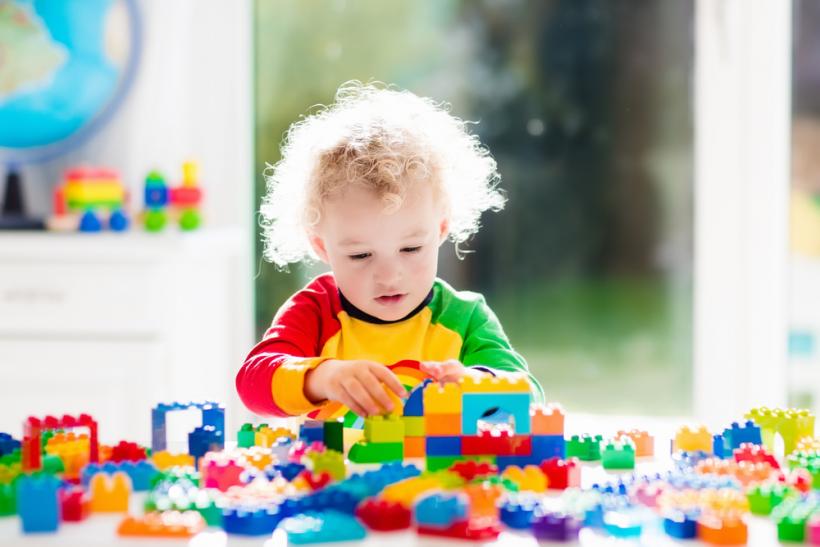
I mess up and do things very differently than I want to sometimes. When that happens, I have one rule for myself: I stop and apologize to my kid.
I'm standing in my three-year old’s small bedroom, the floor covered with blocks and toy trucks. It is the third time I have asked, calmly and politely, cheerfully and determinedly, that he please, please pick up his toys so we can go to the bank. Not only do I want to get our errands done with, not only am I so sick of playing trucks I would gladly do anything else, but if we don’t leave the house soon, we’ll miss the bus. So I’m standing there, on three hours of sleep, barely holding it together, when he says, “Maybe I cannot pick up, maybe I can just play trucks, and you can play with me!”
Let’s freeze frame this moment because this is when all my high-minded parenting ideals go out the window. This is the moment when I feel momentarily so trapped and angry that I can’t see. I yell. I yell loudly.
We're used to the idea that “the parent is always right,” especially when it comes to the fact that kids test boundaries and push limits. It’s easy to see parenting as essentially combative, a power struggle between parents and kids.
“I’m so sick of this crap! It's time to pick up the toys now! Why aren’t you listening to me?!?!” And as I yell, I watch my child’s eyes grow massive with fear. I know my voice is even louder than it sounds in my head, but for the moment at least, I am powerless to stop it.
This is what I call a “parenting screw up.”
Not every parenting screw up is about losing your temper, but in my experience, a lot of them happen when I feel pushed to the limit.
Like all parents, I mess up and do things very differently than I want to sometimes. When that happens, I have one rule for myself: I stop and apologize. Every single time.
Apologizing to my kid regularly is a significant departure from how I was raised. I think it is for most of us. We're used to the idea that “the parent is always right,” especially when it comes to the fact that kids test boundaries and push limits. It’s easy to see parenting as essentially combative, a power struggle between parents and kids. And in that context, showing any weakness is dangerous because what if the kids exploit it?
My mom was loving and kind, but she was also always right. And while the idea that human beings make mistakes in all of our relationships and should apologize for those mistakes isn’t particularly radical, it seems to be when it comes to raising kids.
For the first couple of years of my kid’s life, I wasn’t sure how to deal with the inevitability of parenting mistakes or how to reconcile the way I was parented with my ideas about raising a child. My emotional default was that I wasn’t supposed to be wrong because I was the parent. Rather than deal with the fact that I did screw up from time to time, I put pressure on myself to be as perfect as possible. Being the most ideal parent in the world is an impossibly high standard, but since anything else felt like failure, I continued to strive for it.
You Might Also Like: Stop Saying 'It Can Be Difficult' — And Tell The Truth About Parenting
One day, I was in therapy, talking about something completely unrelated, and this kind of parenting stress came up. My therapist could see that I was tense about it, that I kept saying “I’m doing the best that I can, but it’s not good enough,” and that the stakes felt impossibly high. She told me I had to go easier on myself, which made me scoff.
Then she said, “Why don’t you just try apologizing to your child?”
Apologizing seemed much too simple, but I started doing it. It wasn’t that I had never apologized to my kid before, but I started being more intentional about it. The rule became not just “apologize when you screw up” but to apologize every single time, no matter how upset I was, as soon as I noticed I’d made a mistake. And they had to be genuine apologies. “I’m sorry, but you shouldn’t have been messing with that” wasn’t going to cut it.
It turned out apologizing wasn’t easy. In fact, it was hard as hell. It was humbling to come face to face with my imperfections and to admit to my child that I have the capacity to be wrong and do wrong.
Apologizing has kept me aware of my parenting weaknesses. I've always been ashamed of myself when I yell. When I lose my cool, I want to either pretend it didn’t happen (“oh it wasn’t that loud, I almost yelled”) or find a way to justify it (“I couldn’t help it because you wouldn’t stop throwing things”). In those moments, apologizing means pushing back against those impulses and allowing my kid to see me in a humbled state.
Other mistakes I regularly apologize for include saying yes to things I couldn’t deliver on and saying no when I really should have said yes. I apologize for not explaining things well enough. I apologize for not listening to my kid when I assume that he’s just having some kind of kid meltdown about nothing when he’s actually trying desperately to explain himself to me. I say sorry a lot, and it’s created a culture in my household where my kid isn’t bashful about saying, “Um, can you say sorry to me now?”
Apart from the good it does me, the fact that I can move on from my parenting mistakes when I acknowledge them honestly, there’s an unexpected benefit of this constant string of apologies.
The other day I told my kid we were done watching TV for the day. Predictably, he cried. He raged. He begged. When begging didn’t work, he got even angrier. Eventually, I had to walk out of the room, because it was getting to be too much. The house got quiet, and then he came and found me in the kitchen. Tears streaked his little face, and in a soft voice he said, “I sorry I yelled.”
And that’s the biggest benefit I never saw coming: when I own up to my humanity, admit my flaws, and acknowledge my mistakes with humility, I am showing him that he can do the same.
Kids are learning how to be humans by watching us, and pretending never to screw up only teaches them to be in denial about their own mistakes. Instead, we can help them develop compassion and humility, and that’s better than having perfect parents.








